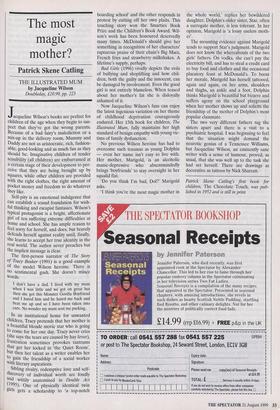The most magic mother?
Patrick Skene Catling
THE ILLUSTRATED MUM by Jacqueline Wilson Doubleday, £10.99, pp. 223 Jracqueline Wilson's books are perfect for children of the age when they begin to sus- pect that they've got the wrong parents. Because of a bad fairy's malediction or a mix-up in the delivery room, Mummy and Daddy are not as aristocratic, rich, fashion- able, good-looking and as much fun as they should be. Imaginative children of tender sensibility (all children) are embarrassed at a certain stage of their development to per- ceive that they are being brought up by squares, while other children are provided with the right clothes, the right amount of pocket money and freedom to do whatever they like.
Self-pity is an emotional indulgence that can establish a sound foundation for wish- ful thinking and escapist fantasies. Wilson's typical protagonist is a bright; affectionate girl of ten suffering extreme difficulties at home and school. She has ample reason to feel sorry for herself, and does, but bravely defends herself against reality until, finally, she learns to accept her true identity in the real world. The author never preaches but the implicit message is clear. The first-person narrator of The Story of Tracy Beaker (1991) is a good example of the model Wilson heroine. There is no sentimental gush. She doesn't mince words:
I don't have a dad. I lived with my mum when I was little and we got on great but then she got this Monster Gorilla Boyfriend and I hated him and he hated me back and beat me up and so I have been taken into care. No wonder my mum sent me packing.
In an institutional home for unwanted children, Tracy pretends that her mother is a beautiful blonde movie star who is going to come for her one day. Tracy never cries (she says the tears are caused by hay fever), frustration sometimes provokes tantrums that get her locked in 'the Quiet Room', but then her talent as a writer enables her to gain the friendship of a social worker with literary aspirations. Sibling rivalry, redemptive love and self- discovery of individual worth are fondly and wittily anatomised in Double Act (1995). One of physically identical twin girls gets a scholarship to 'a top-notch boarding school' and the other responds in protest by cutting off her own plaits. This touching story won the Smarties Book Prize and the Children's Book Award. Wil- son's work has been honoured deservedly many times. McDonald's should give her something in recognition of her characters' rapturous praise of their chain's Big Macs, French fries and strawberry milkshakes. A lifetime's supply, perhaps.
Bad Girls (1996) vividly depicts the evils of bullying and shoplifting and how chil- dren, both the guilty and the innocent, can be damaged by involvement. Even the good girl is not entirely blameless. When teased about her mother's fat she is disloyally ashamed of it.
Now Jacqueline Wilson's fans can enjoy the latest ingenious variation on her theme of childhood deprivation courageously endured. Her 15th book for children, The Illustrated Mum, fully maintains her high standard of benign empathy with young vic- tims of family dysfunction.
No previous Wilson heroine has had to overcome such traumas as young Dolphin — even her name isn't easy to live with. Her mother, Marigold, is an alcoholic manic-depressive who absentmindedly brings 'boyfriends' to stay overnight in her squalid flat.
`Do you think I'm bad, Dol?' Marigold asks.
`I think you're the most magic mother in the whole world,' replies her bewildered daughter. Dolphin's older sister, Star, often a surrogate mother, is less tolerant. In her opinion, Marigold is 'a lousy useless moth- er'.
The mounting evidence against Marigold tends to support Star's judgment. Marigold does not know the whereabouts of the two girls' fathers. On vodka, she can't pay the electricity bill, and has to steal a credit card to buy food and clothes and the occasional placatory feast at McDonald's. To boost her morale, Marigold has herself tattooed, again and again, on her arms, shoulders and thighs, an ankle and a foot. Dolphin thinks Marigold is beautiful but bizarre and suffers agony on the school playground when her mother shows up and solicits the friendship of the mother of Dolphin's most popular classmate.
The two very different fathers tug the sisters apart and there is a visit to a psychiatric hospital. I was beginning to feel that the situation might demand the neurotic genius of a Tennessee Williams, but Jacqueline Wilson, an eminently sane writer with a sense of humour, proved, as usual, that she was well up to the task she had set herself. There are drawings as decorative as tattoos by Nick Sharratt.
Patrick Skene Calling's first book for children, The Chocolate Touch, was pub- lished in 1952 and is still in print.


























































 Previous page
Previous page